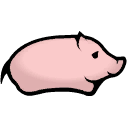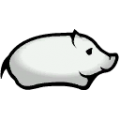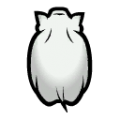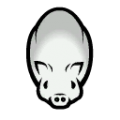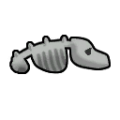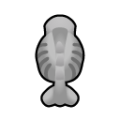Pig
Pig
Pigs were one of the first animals domesticated by humans. They are an efficient source of meat, and are easy to feed because they will eat almost anything.
Base Stats
- Type
- Animal
- Flammability
- 70%
Pawn Stats
- Combat Power
- 45
- Move Speed
- 3.9 c/s
- Health Scale
- 70% HP
- Body Size
- 1.7
- Mass - Baby
- 20.4 kg
- Mass - Juvenile
- 51 kg
- Mass - Adult
- 102 kg
- Carrying Capacity
- 127
- Filth Rate
- 16
- Hunger Rate
- 0.8 Nutrition/Day
- Diet
- omnivorous grazer
- Life Expectancy
- 12 years
- Coastal Animal
- false
- Manhunter Chance
- 0%
- Manhunter Chance (Taming)
- 0%
- Trainable Intelligence
- None
- Wildness
- 0%
- Roam Interval
- 3 days
- Mate Interval
- 12 hours
- Maturity Age
- 0.333 years (20 days)
- Juvenile Age
- 0.1 years (6 days)
- Toxic Resistance
- 50%
- Toxic Environment Resistance
- 0%
- Comfortable Temp Range
- -5 °C – 40 °C (23 °F – 104 °F)
Production
- Meat Yield
 238 pork
238 pork- Leather Yield
 68 pigskin
68 pigskin- Gestation Period
- 5.661 days
- Offspring Per Birth
- 1-2 (1.318 avg)
Melee Combat
- Attack 1
- Teeth
7.3 dmg (Bite)
11 % AP
2 second cooldown
0.7 chance factor - Attack 2
- Head
6 dmg (Blunt)
9 % AP
2 second cooldown
0.2 chance factor - Average DPS
- 2.1638
- tradeTags
- AnimalFarm, AnimalCommon
Pigs, called sows if female and piglets as babies, are domesticated animals, obtainable from both land and space traders. Pigs are omnivorous, making them easy to feed. They will eat live plants and so should be kept away from the growing zones.
Acquisition[edit]
Pigs only spawn as wild animals in scarlands![]() . In all other biomes they must be purchased from a trader of a faction base, or join the colony in an Animals join events.
. In all other biomes they must be purchased from a trader of a faction base, or join the colony in an Animals join events.
Summary[edit]
Pigs are pen animals. Once tamed, pen animals cannot and do not need to be trained any further. But if left outside of a pen or caravan hitching spot, pen animals will eventually roam outside your colony. Making a caravan is not required to tie animals to a caravan hitching spot.
Analysis[edit]
Pigs are worse for food : grass than a variety of other grazers, from cows and chickens, to horses, ibex, and alpacas. Even chinchillas are better. The pig's niche is as the most nutritionally efficient omnivore, that does not require taming upkeep. By locking them into a corpse freezer full of dead raiders, this permits the conversion of long pork into pork pork as long as temperature can be maintained between 0 °C (32 °F) and their minimum comfortable temperature of -5 °C (23 °F). Large numbers of pigs will also make maintaining temperature more difficult, as coolers will need to work against their collective body heat warming the freezer.
Wild boars are the next most efficient omnivore (without training upkeep). Boars are worse for nutrition, but are better at surviving cold temperatures (and can be found in the wild), allowing a freezer to operate at lower temperatures to delay spoilage during outages.
Many carnivores, such as foxes, are even more nutrient efficient than pigs if they are exclusively being fed corpses. However, most also require taming upkeep, cutting into colonist time.
Nutrition[edit]
When slaughtered, a pig yields 48 meat and 20 leather as a piglet; 119 meat and 36 leather as a juvenile; or 238 meat and 68 leather as an adult. 1 meat is equal to 0.05 nutrition.
An adult pig consumes 0.8 nutrition per day, and a female creates up to 0.23 offspring per day.
- When offspring are slaughtered as babies, a female pig will produce 0.56 nutrition of meat per day, giving a potential nutrition efficiency of 69.8% (not counting males).
- If the offspring are allowed to grow to adulthood, they will consume an additional 2.4 nutrition per day, but will instead yield 2.77 nutrition per day as they are slaughtered, resulting in a potential nutrition efficiency of 86.5%.
When considering a population of equal numbers of males and females, these nutrition efficiencies fall to 34.9% for baby slaughter and 69.2% for adult slaughter.
The next best pen-omnivore, the wild boar, has an potential nutrition efficiency of 71.1% (or 56.5% nutrient efficient with 1:1 female:male). For comparison, a horse has a base nutrient efficiency of 121.9%, much higher than a pig or wild boar. Chickens, ibex, and deer reach similar numbers.
Foraging[edit]
| Forager | Forage Nutrition per day |
|---|---|
| Raccoon | .24 |
| Pig | 1.02 |
| Wild Boar | .51 |
| Gorilla | 1.2 |
| 10 Plants Skill Pawn | 0.9 |
Training[edit]
This animal can be trained as follows:
| | |
| | |
| | |
| |
*As of version 1.1.2610, all animals can be tamed. The percentage of likelihood of success depends on factors such as the Animals Wildness Percentage, Pawn Handling Skill, and others. More information can be found on the animals page.
![]() In addition, a Pig can be trained to perform 'Forage': “The animal will occasionally find berries, mushrooms, or food. Animals will find more food in biomes with higher forageability. Foraging can only be done on fertile terrain.”
In addition, a Pig can be trained to perform 'Forage': “The animal will occasionally find berries, mushrooms, or food. Animals will find more food in biomes with higher forageability. Foraging can only be done on fertile terrain.”
Health[edit]
The body part table is collapsed due to length. Expand to view.
| Part Name | Health | Quantity | Coverage[1] | Target Chance[2] | Subpart of | Internal | Capacity[3] | Effect if Destroyed/Removed |
|---|---|---|---|---|---|---|---|---|
| Body | 28 | 1 | 100% | 26% | N/A[4] | - | Death | |
| Spine | 17.5 | 1 | 3% | 3% | Body | Moving |
−100% Moving[5] | |
| Stomach | 14 | 1 | 3% | 3% | Body | Digestion |
−50% Digestion | |
| Heart | 10.5 | 1 | 3% | 3% | Body | Blood Pumping |
Death | |
| Lung | 10.5 | 2 | 3% | 3% | Body | Breathing |
−50% Breathing. Death if both lost. | |
| Kidney | 10.5 | 2 | 3% | 3% | Body | Blood Filtration | −50% Blood Filtration. Death if both lost. | |
| Liver | 14 | 1 | 3% | 3% | Body | Digestion |
Death | |
| Neck | 17.5 | 1 | 22% | 5.5% | Body | Eating Talking Breathing |
Death | |
| Head | 17.5 | 1 | 75% | 2.475% | Neck | - | Death | |
| Skull | 17.5 | 1 | 25% | 1.2375% | Head | - | Cannot be destroyed Increasing Pain based on damage. | |
| Brain | 7 | 1 | 70% | 2.8875% | Skull | Consciousness |
Death Damage always results in scarring. | |
| Eye | 7 | 2 | 12% | 1.98% | Head | Sight |
−25% Sight. −100% if both lost. Damage always results in scarring. 0% Hit Chance against Blunt damage. | |
| Ear | 8.4 | 2 | 8% | 1.32% | Head | Hearing |
−25% Hearing. −100% if both lost. | |
| Nose | 7 | 1 | 10% | 1.65% | Head | - | - | |
| AnimalJaw | 7 | 1 | 10% | 1.65% | Head | Manipulation |
−100% Manipulation. Can no longer use Bite attack. | |
| Front Leg | 21 | 2 | 7% | 5.95% | Body | Moving |
−25% Moving. −50% if both lost. Can no longer use Hoof attack.[6] | |
| Front Hoof | 7 | 2 | 15% | 1.05% | Front Leg | Moving |
−25% Moving. −50% if both lost. | |
| Rear Leg | 21 | 2 | 7% | 5.95% | Body | Moving |
−25% Moving. −50% if both lost. | |
| Rear Hoof | 7 | 2 | 15% | 1.05% | Rear Leg | Moving |
−25% Moving. −50% if both lost. |
- ↑ Coverage determines the chance to hit this body part. It refers to the percentage of the super-part that this part covers, before its own sub-parts claim their own percentage. For example, if the base coverage of the super-part is 100%, and the coverage of the part is 20%, 20% of hits would hit the part, and 80% the super-part. If the part had its own sub-part with 50% coverage, the chances would be 10% sub-part, 10% part, 80% super part.
- ↑ Target Chance is the actual chance for each part to be be selected as the target when each part's coverage has been taken into account(I.E. Neck covers 7.5% of Torso but Head covers 80% of Neck so it actually has only a 1.5% chance to be selected). This is not pure hit chance, as different damage types propagate damage in different ways. See that page for details.
- ↑ Note that capacities can affect other capacities in turn. Only the primary effect is listed. See specific pages for details.
- ↑ This is the part that everything else connects to to be considered 'connected'.
- ↑ If Moving drops below 16% a pawn cannot move.
- ↑ A Blunt/Poke attack with cooldown of 2s. The actual Hoof is unrelated
Attack table
| Attack (Damage type) |
DPS[1] (Post Hit Chance)[2] |
Dam. | Cool. | AP | Selection chance[3] | |
|---|---|---|---|---|---|---|
| Average | 3.49 (2.16) |
- | - | 10.5% | - | |
| Teeth (Bite) |
3.65 (2.26) |
7.3 | 2s | 11% | 75% | |
| Head (Blunt) |
3 (1.86) |
6 | 2s | 9% | 25% | |
- ↑ Note: This is the actual base average derived from the melee verb system updated in 1.1.2610, it may sometimes disagree with the listed value in the in-game infobox.
It may also change depending on the stats and the melee verbs available to the pawn. - ↑ Assuming a melee hit chance of 62%
- ↑ Chance for attack to be selected. It may change depending on the melee verbs available to the pawn.
Gallery[edit]
Version history[edit]
- 0.12.906 - Added
- 1.3.3066 - Trainability changed from advanced to none, pigs now are predominantly a pen animal.
